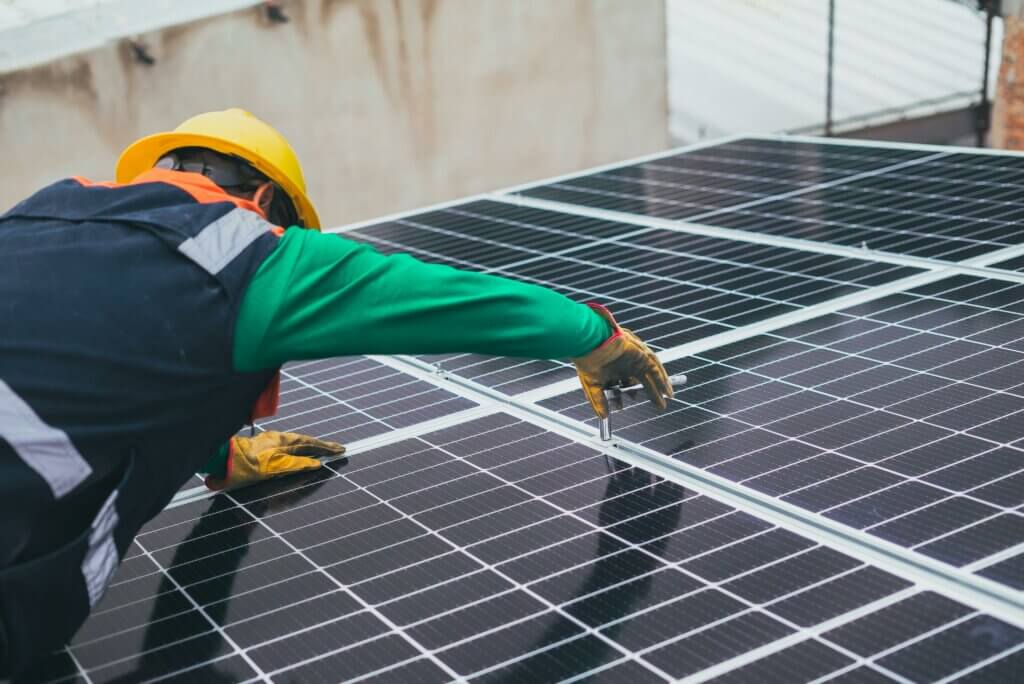The energy efficiency plan is becoming an urgent necessity for businesses, faced with the climate emergency and rising energy prices. Indeed, reducing energy consumption is not only an ecological gesture , but also a way to save money and improve energy performance.
A sobriety plan allows companies to structure their approach and implement concrete actions to reduce their energy consumption. It is a valuable tool for supporting companies’ energy transition and contributing to the fight against climate change.
Implementing an energy efficiency plan requires a methodical and rigorous approach. It’s essential to begin by conducting an energy audit to identify the most significant consumption areas. Next, you need to define specific and measurable consumption reduction targets.
Implementing an energy efficiency plan is a corporate project that must involve all employees. It is essential to communicate and raise staff awareness about the challenges of energy efficiency and to involve them in the process.
Many resources are available to help businesses implement an energy efficiency plan. The Ministry of Energy Transition offers a comprehensive practical guide on energy efficiency .

Energy sobriety plan: concrete measures to reduce our consumption
Faced with the growing increase in energy consumption and its environmental impacts, energy efficiency is emerging as an essential solution for reducing our carbon footprint and preserving natural resources. An energy efficiency plan involves implementing concrete measures to reduce our energy consumption in all sectors of activity, whether buildings, transportation, industry, or agriculture.
Adopting simple everyday actions is an essential first step toward energy efficiency. Turning off lights when not in use, unplugging electrical appliances on standby, lowering the heating by one degree, or favoring public transportation. These are all actions that, while modest individually, can have a significant impact on a collective scale.
Beyond individual actions, implementing public policies and corporate strategies is essential to amplify energy efficiency efforts. This involves renovating buildings to improve their energy performance, investing in renewable energy , and developing more sustainable modes of transportation.
Energy sobriety in buildings
Buildings are responsible for a significant portion of global energy consumption. Faced with the climate emergency and the need to reduce our greenhouse gas emissions, energy efficiency in buildings is becoming a crucial issue.
Optimizing the energy performance of buildings can significantly reduce their energy consumption, while improving their thermal comfort and reducing operating costs. Several solutions can be implemented to improve the energy performance of buildings, such as:
- Improve the thermal insulation of walls, roofs and floors to limit heat loss.
- Install high-performance double or triple-glazed windows for better thermal and sound insulation.
- Renew heating and air conditioning systems with more efficient and less energy-consuming models.
- Install more efficient domestic hot water production systems, such as condensing boilers or thermal solar panels.
- Optimize lighting by using LED bulbs and installing smart lighting management systems.
In addition to these technical solutions, it is also important to adopt responsible behaviors to reduce energy consumption in buildings. This involves raising awareness among occupants about the challenges of energy efficiency and encouraging them to adopt simple actions, such as:
- Turn off lights when not in use.
- Turn down the heating in winter and turn up the air conditioning in summer.
- Unplug electrical appliances on standby.
- Favor natural ventilation methods over artificial air conditioning.
By implementing technical solutions and adopting responsible behaviors, we can significantly reduce the energy consumption of buildings and contribute to a more sustainable future.

Energy efficiency in transport: promoting more sustainable modes of travel
Transportation is a major energy consumer and contributor to greenhouse gas emissions. Promoting more sustainable travel is a key strategy for reducing energy consumption in the transportation sector. This includes promoting the use of public transportation, cycling, walking, and carpooling, instead of private cars.
Developing sustainable transport infrastructure is also a key element in encouraging the adoption of alternative modes of transport. This includes the creation of cycle paths, efficient public transport networks, and park-and-ride facilities to facilitate intermodal transport.
Encouraging technological innovation can also help optimize the energy efficiency of transportation. The development of electric and hybrid vehicles, intelligent transportation systems, and shared mobility solutions can play an important role in reducing energy consumption in the transportation sector.
By adopting responsible behaviors and supporting ambitious policies, we can all contribute to reducing our carbon footprint and creating a more sustainable transportation system. Here are some examples of concrete measures that can be implemented to promote energy efficiency in transportation:
- Develop public transport by increasing the frequency of services, improving the quality of service and reducing fares.
- Establish low-emission zones in city centers to limit the circulation of polluting vehicles.
- Encourage carpooling by setting up carpooling platforms and providing financial incentives to carpoolers.
- Develop safe and comfortable cycle paths to encourage cycling.
- Invest in electric and hybrid vehicles to reduce greenhouse gas emissions.
- Raise awareness among citizens about the challenges of energy efficiency in transport and encourage them to adopt responsible behavior.
By mobilizing all stakeholders in society, we can meet this challenge and build a more efficient and environmentally friendly transport system.
Energy sobriety in industry: improving the energy efficiency of industrial processes
Industry is a major energy-intensive sector. Industrial processes often require large amounts of energy to operate, contributing significantly to greenhouse gas emissions.
Improving the energy efficiency of industrial processes is a crucial issue for reducing energy consumption in this sector and contributing to the fight against climate change. Several solutions can be implemented to improve the energy efficiency of industrial processes, such as:
- Optimize production processes by identifying and eliminating energy waste.
- Implement energy recovery systems to reuse waste heat generated by industrial processes.
- Invest in more efficient and less energy-consuming equipment.
- Adopt energy management systems to better manage and control energy consumption.
- Raise employee awareness of the challenges of energy efficiency and encourage them to adopt responsible behavior.
Energy efficiency in industry requires a comprehensive approach that involves all stakeholders in the value chain, from energy suppliers to end customers. Governments can play an important role by encouraging technological innovation, providing financial incentives, and regulating the energy consumption of industrial companies.
Companies also have a major role to play by implementing ambitious energy efficiency plans and investing in the energy efficiency of their facilities.
Energy efficiency in industry is a significant challenge, but it is also an opportunity to reduce operating costs, improve competitiveness, and contribute to a more sustainable future. By mobilizing all stakeholders in the industrial sector, we can meet this challenge and build a more energy-efficient and environmentally friendly industry. Here are some examples of concrete measures that can be implemented to improve the energy efficiency of industrial processes:
- Carry out an energy audit to identify the most significant energy consumption items.
- Implement systems for measuring and monitoring energy consumption.
- Set energy consumption reduction targets.
- Implement energy-saving actions, such as insulating industrial buildings, optimizing lighting and heating systems, and replacing energy-consuming equipment.
- Invest in innovative technologies, such as cogeneration, methanization and renewable energies.
- Raise awareness and train employees on the challenges of energy efficiency.
Furthermore, energy efficiency in industry is an ongoing process that requires a strong commitment from businesses and public authorities.

Energy sobriety in agriculture
Agriculture is a sector that consumes large amounts of energy, particularly for irrigation, greenhouse heating, transporting agricultural products, and food processing. Reducing energy consumption in agriculture is a crucial issue for limiting the environmental impacts of this sector and contributing to the fight against climate change.
Adopting more environmentally friendly agricultural practices is a key strategy for improving energy efficiency in agriculture. This involves promoting organic farming, developing agroforestry, reducing the use of chemical inputs, and promoting sustainable soil management.
Organic farming significantly reduces energy consumption by limiting the use of chemical fertilizers and pesticides, which are major sources of greenhouse gas emissions.
Agroforestry involves growing trees alongside agricultural crops. This practice reduces soil erosion, improves water quality, and captures carbon. It can also help reduce energy consumption by providing shade for crops and reducing the need for irrigation.
Reducing the use of chemical inputs helps limit greenhouse gas emissions and preserve biodiversity. This involves promoting biological pest control methods and developing organic fertilizers.
Sustainable soil management improves soil fertility and reduces the need for chemical fertilizers. This involves practicing conservation agriculture, which involves limiting tillage and permanently covering the soil.
Energy efficiency in agriculture requires a profound transformation of farming practices. Public authorities can play an important role by encouraging the adoption of more environmentally friendly farming practices and supporting research and development in this area. Farmers also have a major role to play by adopting innovative practices and adapting to climate change.
Energy efficiency in agriculture is a major challenge, but it is also an opportunity to reduce the environmental impacts of this sector, preserve biodiversity, and contribute to a more sustainable future. By mobilizing all stakeholders in the agricultural world, we can meet this challenge and build a more energy-efficient and environmentally friendly agriculture.
Energy sobriety plan: a real asset
In conclusion, energy efficiency is an essential lever for companies wishing to reduce their environmental impact and improve their economic performance. Implementing an energy efficiency plan helps structure the approach and implement concrete actions to achieve ambitious energy consumption reduction goals.
Furthermore, implementing an energy efficiency plan is a crucial step in our journey towards a successful energy transition. By adopting an energy efficiency approach, we can reduce our energy consumption while improving our energy performance. The energy savings achieved through such a plan contribute to environmental protection by reducing greenhouse gas emissions . It also contributes to the competitiveness of businesses by reducing their energy costs.
However, implementing an energy efficiency plan is not limited to technical aspects; it also requires a change in mindset and behavior. It is crucial to involve all stakeholders, from governments to businesses to citizens, to ensure the success of this initiative.
Additionally, awareness-raising and training are essential tools to support this transition. Finally, it’s important to emphasize that energy efficiency isn’t just about saving energy, but also about rethinking the way we live and consume. By adopting more sustainable practices and fostering innovation, we can create a future where energy efficiency is the norm and our ecological footprint is minimized. Contact our renovation company for personalized support.







